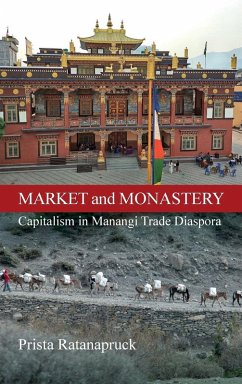In the established historiography of trade in Asia, the emergence of Western trading empires invariably triggered the decline and dispersal of old trading networks. In this transregional ethnographic history of the Manangi, a Buddhist trading community from northern Nepal, Prista Ratanapruck provides counter evidence, elucidating how kinship, social, and religious institutions have facilitated the expansion of Manangi trade across South and Southeast Asia. Expounding on how social and moral values shape capital production, accumulation, and redistribution, Market and Monastery examines the entwining relationship between trade and the Manangi's pursuit of social and spiritual aspirations, ultimately illuminating an intriguing form of capitalism.
Hinweis: Dieser Artikel kann nur an eine deutsche Lieferadresse ausgeliefert werden.
Hinweis: Dieser Artikel kann nur an eine deutsche Lieferadresse ausgeliefert werden.








